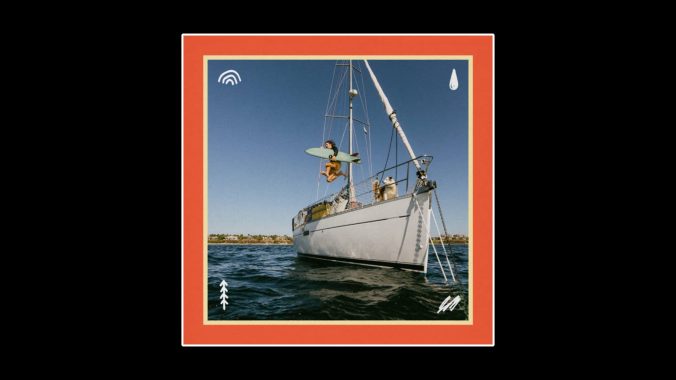Goth Babe Brings the Beat on Lola
The environmentalist-cum-pop musician produces festival-ready psychedelia of varying quality on long-awaited first album.

To understand Goth Babe—and his debut album for Mom + Pop titled Lola—you have to look back to nearly nine years ago. Teen skateboarding enthusiast Griff Washburn and his buddies took direct inspiration from beachy psych-surf titans like Surf Curse and Ty Segall and, as newly minted punks, their band released their Fuzz Ghost EP on the now-defunct Richmond tape label Ongakubaka Records.
Before long, however, Chattanooga-born Washburn grew weary of college doldrums in Nashville and began pursuing a more nomadic lifestyle, testing the waters in cities like New York and Los Angeles before embracing camper life. Eventually, he built himself—and his dog, Sadie—a tiny house in the country outside Portland, which burned down amidst his recovery from chronic migraine. Undeterred, Washburn took his nomadism to the next level, learning to sail and embarking on a 1,200-mile journey down the Pacific to Mexico, Sadie by his side all the way, with the help of buddies making supply drops throughout. He named that sailboat Lola and, in turn, the album is a collection of tracks dreamed up on that voyage.
As Washburn’s living quarters have changed, so has Goth Babe’s output across a slew of EPs and loosies, with electronics playing a bigger role as his workspace grew smaller. After striking out on his own, the fuzzy, sun-dried punk of his youth gave way to psychedelic pop—like on 2017 standouts “Early Mornings,” “Topanga” and “Sometimes.” These songs sound more like chillwave filtered through a bedroom pop prism, released alongside the meteoric rises of Clairo and Glass Animals, whose takes on psychedelia and pop led them to different varieties of popularity. The feel-good, festival-ready “Weekend Friend” propelled Goth Babe to new heights in 2019 and, since then, the project has been best known for pop living between the dizziness of Gold Panda and the luster of Miike Snow. On Lola, Washburn does not limit the Goth Babe style to exactly one sound, but this danceable, feel-good psych pop remains his bread and butter. At times, the music shines like gentle sunrays, and at others, it feels flat and disorienting, offering little more substance than a good vibe.
Album opener “Neon Trees” offers a gooey sonic preview, gradually mounting layers of programmed percussion, guitar and electronics while Washburn’s voice echoes up top. “Spinnaker Days” comes next, with punctuated electronic percussion, low-lying guitars, beat drops and handclaps galore; all of that to say it’s unfocused. Bubbling guitars lead the way on “Sadie,” a song so sentimental that it revels in lovely “ahhhs” and images of run-arounds. On “Backwards,” Washburn invites singer/songwriter buddy WATTS to contribute to a bass-and-beat-laden piano ballad on impending heartbreak, swinging between anticipated regret and catharsis. However, as honest and clean as it is, the production and the lyrics are at odds; it feels as if the production came about to maximize its might during performance instead of optimizing the emotional impact of its lyrics. Vibey? Yes. Confounding? Also yes.
With its changing textures and clear delineation between chorus and verses, “Sun Comes Up” is one of Lola’s high points: The track is busy, yes, but every component has a clear purpose. After such a climax, an intricate guitar passage like “Orcas” is a commendable insertion. “Bioluminescence” is one of the album’s more ambitious tracks, living somewhere between the modern Goth Babe experience and the grandiosity of classic M83, that of which celebrates his adventurous path and his constant pursuit of a better world.
-

-

-

-

-

-

-

-

-

-

-

-

-

-

-

-

-

-

-

-

-

-

-

-

-

-

-

-

-

-

-

-

-

-

-

-

-

-

-

-








































